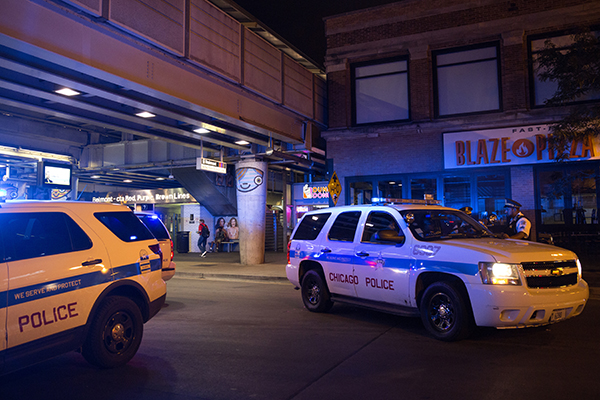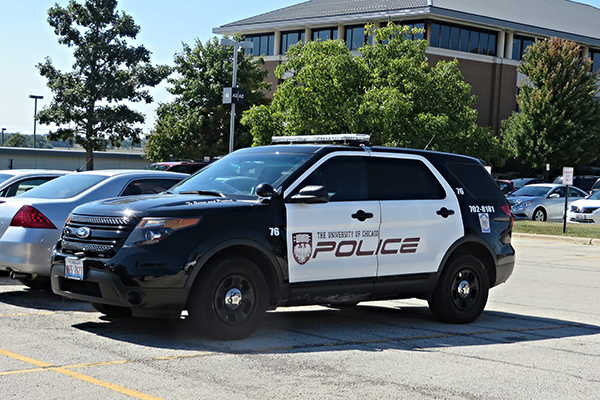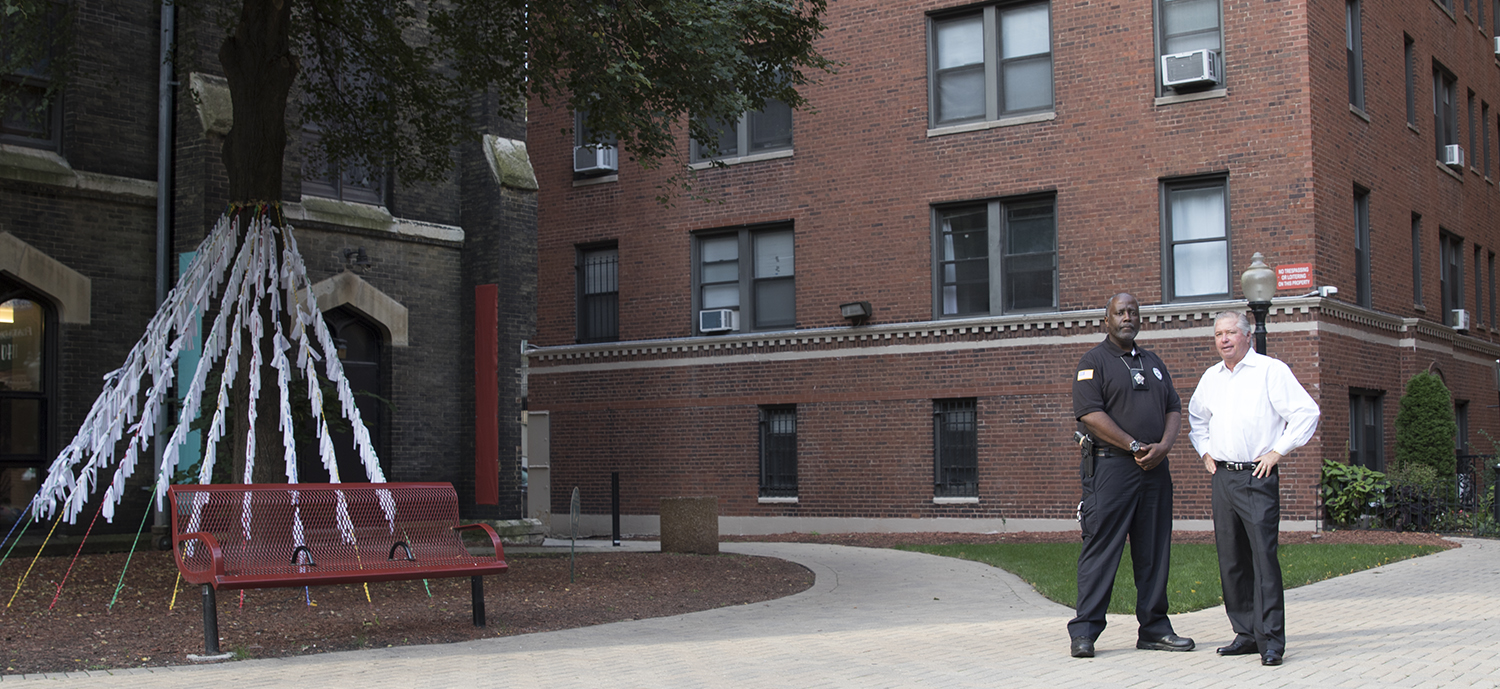Photo: Bettina Chang
Though this year's rise in gun violence and homicides has affected South and West side neighborhoods the most, people across the city are increasingly worried about their safety. But residents of some North Side neighborhoods have a luxury others don't: the means to hire private companies to patrols their streets.
Hired security is hardly a new idea—gated communities, banks, malls, and other private businesses have long contracted their own security services. Private policing of public streets, however, is less common. And while the practice may satisfy its customers in the short-term, in the long run it risks wide-ranging effects on public safety that may exacerbate inequality in a city struggling with segregation.
Donald Mudd, 58, says his Gold Coast neighborhood on the 1100 block of North LaSalle Street for years was overrun with drug dealers and users who lingered and sold drugs without fear of the police. This summer, he contracted private security patrols from CORE Security Group, run by police officer Howard Greer; in a little over a month, the armed, off-duty police officers had cleaned up his block, Mudd tells Chicago.
“I’ve been watching this for years, the same characters,” says Mudd, a retired businessman who's lived in the neighborhood for 13 years. “They’re still selling, [but] those characters are now doing it on another street corner.”
Mudd's not alone. The Southport Community Alliance, a cluster of Lake View families that includes Cubs' general manager Theo Epstein and his wife Marie Whitney, has hired a firm since July to patrol the area, the Sun-Times reported this week. Businesses in Wicker Park and Bucktown plan to spend $50,000 on security initiatives, and some are pushing for more dollars for private patrols for that area. Over the last few summers, the Gold Coast Neighbors Association (not related to Mudd) has hired two guards to patrol around businesses late at night during the summer as well as weekends and holidays, according to the organization’s website.
The use of private police—in theory only accountable to those who pay them—has raised questions and concerns. Can or should private security make arrests or intervene when they see potential crime? Do they carry weapons? How aggressive can private guards be and what laws and regulations do they have to follow?
Most private security are employed by businesses who seek to use off-duty city or suburban police officers, says Victor Iorfida, a Chicago-area security consultant who owned his own firm for 12 years and worked with clients such as the Catholic Charities and University of Illinois at Chicago. Firms charge clients around $20 to $25 per hour and the guards are generally paid around $10 or $12 per hour from that fee. It’s a relatively low wage that makes it difficult to attract off-duty police officers who are coveted for the role, Iorfida explains, which is why they compose only a small percentage of the industry.
Off-duty police officers get the benefit of the doubt in court if they use more aggressive policing tactics, including firing their weapon, Iorfida says. While police departments encourage officers to carry weapons while they are off the clock—including acting as a private security guard in a second job—security guards who are not police, who constitute the majority of private security officers, generally don’t carry weapons.
Advertisement
“A lot of ways what I think they’re doing is more [being] eyes on the street, and they’re relying on the police force,” Iorfida says. "We would often say your best tool is your phone." He explains that private security officers normally do not make arrests and intervene directly; if a guard, whether an off-duty cop or not, feels they can detain someone safely, they might do so but look to pull in on-duty police quickly to make an arrest.
Those non-police guards who do carry a firearm are subject to a minimal training requirement regulated by the state. The requirements involve ensuring a minimal target proficiency and knowing how to holster a weapon, or proving “you’re not Barney Fife, you’re not going to shoot your foot,” Iorfida says.
Arthur Hannus, the CEO of American Heritage Protective Services of Alsip, Ill., agreed with that assessment. His firm was contracted by the Southport Community Alliance, according to a version of the Alliance’s website that has since been taken down. Hannus, whose firm employs off-duty city and suburban police as well as civilians, declined to discuss Southport specifically but generally described what his firm does.
“None of these [private security] companies are doing policing,” Hannus tells Chicago. “They act essentially as lookouts, ready to call police if they see criminal activity or something suspicious… and [security guards] make good witnesses.” Local police are simply more willing to believe and act quickly on the suspicion of someone trained in policing and security, Hannus says.
For Mudd, who says his LaSalle Street block has benefited significantly from private police, it’s the armed presence from the off-duty officers that has made the biggest difference. The results have been so drastic and rapid, that Mudd, who foots the bill himself, says he plans to approach neighbors about potentially contributing to the private security contract for the long term. He expects this year’s bill to cost him around $70,000.
“I wish I didn’t have to do it, but this is the permanent solution … for my neighborhood,” he says. “I haven’t done anything to help anyone with the bigger problems and I feel bad about that. I’ve pushed the problem to someone else.” In other words, he knows the drug dealers on his block have simply relocated to someone else’s front door.


As police have been redeployed to areas where violence is more prevalent, Lake View residents have been vocal about keeping their own streets safe. Last month Mayor Rahm Emanuel promised to hire 1,000 new officers for the department over the next two years, but these residents are looking for quicker results after a trying summer; robberies and other violent crime were on pace to be the worst in Lake View since 2003, according to DNAinfo.
Ald. Tom Tunney, whose 44th ward includes most of Lake View, has requested to bring more police officers to his ward, but notes that he’s not the only one.
“There’s 40 other aldermen who would like to have more police in their wards,” Tunney says. “Some of the other aldermen think ‘Ald. Tunney, Lake View is not our problem.’”
One change Tunney says he's noticed is more robberies that involve gunfire. “That part I would say is relatively new phenomenon in the last couple years,” he says. Locals were shaken in summer 2015 when 25-year-old Kevin O’Malley was shot and killed after an alleged robbery; O’Malley’s death was reportedly the first homicide in the area in three years.
Asked about the Southport area’s turn to private security, Tunney says he doesn't have any specific objections, although he avoids opining on whether the program is beneficial to his ward. "[If] it helps keep our neighborhoods be safer, I’m supportive of it,” he says.
Private security has raised eyebrows elsewhere as some cities (most notably, New Orleans) have started to lean on it as a permanent solution. The University of Chicago’s campus force, which also patrols the surrounding Hyde Park area, is one of the largest private operators in the country. It's been criticized for a lack of transparency, racial profiling, and brutality, says Craig Futterman, a University of Chicago law professor who focuses on civil rights issues. The issues came to a head in 2014 when hundreds signed a petition asking the university for more oversight; since then, some reforms have passed, Futterman says.
In New Orleans, Mayor Mitch Landrieu has looked at the private-public partnership for policing as an entrepreneurial way to deal with persistent crime across the city, as detailed in a July 2015 New York Times Magazine story. But critics say the rise of private police has exacerbated racial tensions and benefited only wealthy communities, and Futterman says he hopes Chicago does not do the same. “I don’t think we should be abdicating responsibility for something that should be a role of the state,” he says, especially since private companies are not subject to state transparency requirements. Meanwhile, the Chicago Police Department is having its own accountability crisis, and has been successfully sued in recent months and years for its failure to abide by open records laws.
As Futterman says, private companies "open up all kinds of cans of worms." Legal scholars and others have raised concerns about civil liberties, a lack of state law governing private police, improper conduct from officers who have inadequate training, and, ultimately, a loss of city police jobs as public officials begin to see private security as a permanent solution, according to a summary from a 2014 Harvard Kennedy School report.
Chicago has its own precedent on whether private security can work: Marquette Park. In the mid-'90s, the South Side neighborhood residents saw rising crime in Englewood and were determined to ensure they were protected as Chicago police presence waned, according to a 2002 Chicago Reader story. So they petitioned City Council to allow them to have their own special taxing district (known as a Special Service Area), paying about $70 a year in additional property taxes to hire their own armed security.
Within the area where Marquette Park employed security, crime dropped by nearly 21 percent over a five-year period, according to the Reader, a steeper drop than the rest of Marquette Park’s police district. Residents said that private security would clear away loiterers or others with relatively minor infractions—low-priority calls that police would not likely handle.
The system is still in place in Marquette Park now, though it has not been replicated in other neighborhoods yet. (A Wicker Park/Bucktown SSA fund will likely dedicate money to enhanced security, but details have not yet been released.) Iorfida, the Chicago-area security consultant, points out that, while he says he’s not specifically involved with any pending contracts, there is potential for corruption with this type of setup. Since SSA designations levy taxes for neighborhood improvements, some of those dollars could simply be redirected to firms and police officers who have good connections with area alderman—“sweetheart deals,” he says.
Advertisement
Marty Doyle, responding on behalf of the Southport Alliance group, says that the group is considering a special taxing district. “We are studying the idea of an SSA (like Marquette Park) but with an 18 month lead time we needed to act now to ensure the safety of our community,” he wrote in an email.
Others in Lake View are frustrated. Elaine Osgood says she formed the Taking Back Lakeview Neighbors Group Facebook page when she heard about a friend who was shot in River North. The persistent talk of crime in her circle and within the neighborhood—especially robberies involving guns, which go beyond the usual bar skirmishes or drunk behavior late at night—prompted her to take action. Osgood, 32, who says she's lived in the neighborhood for most of her adult life, brought together neighbors in April to discuss the issue in person. The Facebook group she founded now has more than 2,100 members.
“Now [the crime is] daily,” she says. “It’s a large community and it's like ‘what are we going to do?’ [Crime is] out of control.”
Marie Poppy, a longtime Lake View resident and community activist focused on crime issues, says the community responded when Tunney and police officials called on the community to take precautions after their police district was combined with another in 2012. At the time, Poppy and others say, police officials promised that police presence and patrols would remain unaffected by the district change. Instead, Chicago police patrols have diminished in the area, frustrating residents, according to a September DNAinfo story.
The community has been proactive and responsive, she says. The Cubs organization, area hospitals, businesses, and chamber organizations all banded together on initiatives big and small—such as putting a moratorium on liquor licenses and ensuring everyone was keeping porch lights on and windows and doors locked.
Those measures have now been exhausted, Poppy says, and she and others believe more measures need to be taken, even as many residents were worried about the area’s already high taxes. Following the Southport Alliance’s lead, Poppy says she is looking into private security on behalf of a few dozen neighbors who live within the central Lake View area.
But they don’t necessarily view private security as a long-term fix. Osgood says she wants to rally people around the agenda of Emanuel and Police Supt. Eddie Johnson to get guns off the street and give harsher sentences for violent offenders.
For many in Lake View, those larger political solutions won’t salve immediate fears. For example, Poppy says she saw something that she hadn’t seen in years in an alley off Sheffield Avenue: a graffiti tag later identified by police as a gang tag. Add that to several shootings, armed robberies, and several area children robbed in broad daylight at Wrightwood Park by teens wielding knives, and she says it’s clear to her that more needs to be done.
“It’s not just the bars anymore,” she says. “Even with all the lines of safety, defense, people know there just aren’t enough police to go around and want to look at other steps to improve our safety … hopefully the politics and city sorts itself out soon, because it all comes down to the policymakers to really turn this situation around all across the city.”



